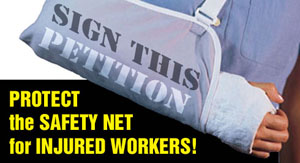OPINION
Protect workers’ compensation safety net for middle class

 By REPS. BOB HASEGAWA and MIKE SELLS
By REPS. BOB HASEGAWA and MIKE SELLS
Unless you’re self-employed, you’re probably covered by our state’s workers’ compensation program. It affects pretty much anyone who brings home a paycheck.
Still, a serious injury on the job is something many of us never have to worry about. When we think of injured workers, we tend to think of loggers and heavy-equipment operators and other hazardous jobs.
But the ranks of injured employees include everyday office employees: the guy whose back goes out after lifting too many boxes of copy paper; the secretary who can no longer click a computer mouse because of a repetitive-stress injury; or the delivery guy who shatters a hip slipping on a patch of ice. We’re talking about software designers, pizza twirlers, supermarket cashiers.
Our proven, century-old workers’ comp system protects all of these employees and their families from economic ruin in the event of a severe or long-term injury. That’s the good news.
The bad news is that a number of bills before the state Legislature this year would peel back those protections on multiple fronts.
For instance, Senate Bill 5112 would let employers shape the criteria that determine the extent of an employee’s injury and whether the employee is fit to return to work. Under the existing system, the state Department of Labor and Industries ensures that the criteria fairly balances the interests of employee and employer. This bill would remove the employee’s right to a fair and objective assessment.
Two other bills, SB 5127 and SB 5128, would change the requirement that injured employees must be 55 years or older to enter into structured-settlement agreements, which were created to allow badly injured older workers to bridge the gap to retirement instead of retraining for new careers. This bill drops the age limit to 40. There are numerous reasons this is a bad idea:
The structured-settlement option was begun only in January of 2012 and has been used only a few times so far. It makes little sense to expand a program before we even know whether it’s working.
It’s one thing for an older worker to accept a settlement that bridges the gap to retirement. It’s another thing altogether to expect a 40-year-old worker to make an enlightened decision about a settlement on which he may depend for his livelihood, health and family security for the rest of his life. A 40-year-old simply doesn’t look at retirement and plan for security as shrewdly as a 55-year-old who sees retirement just over the horizon.
This bill would prohibit the Board of Industrial Insurance Appeals from considering “best interest of the worker” standards in the case of a represented worker.
Medical benefits are also the riskiest and most costly part of the claim. There is no way of anticipating the long-term complications of a serious injury early in life.
These bills follow a sadly familiar pattern of diminishing respect and support for the middle class. Got a shortfall? Lay off middle-class employees. Got a recession? Cut programs that provide the safety net for middle-class employees. Don’t like paying workers’ comp premiums? Slash protections for employees who get injured.
Our middle class has been the envy of the world, but it won’t stay that way if we keep whittling away at the pieces that keep it healthy. How long before we realize we’re behaving like a snake eating its own tail? We know how that story ends, and it’s not a happy ending.
State Sen. Bob Hasegawa, D-Seattle, left, sits on the Senate Commerce & Labor Committee. Rep. Mike Sells, D-Everett, chairs the House Labor & Workforce Development Committee. This column, which originally appeared in The Seattle Times, is reposted here with the authors’ permission.
 TAKE A STAND! Sign an electronic petition to Washington state lawmakers urging them to PROTECT THE SAFETY NET FOR INJURED WORKERS! The petition reads: “I urge my State Legislators to STRONGLY OPPOSE efforts to undermine the workers’ compensation safety net for injured workers. I oppose Senate Bills 5112, 5127 and 5128. No more “reforms” until we see how the changes currently being implemented are working!” Sign it today!
TAKE A STAND! Sign an electronic petition to Washington state lawmakers urging them to PROTECT THE SAFETY NET FOR INJURED WORKERS! The petition reads: “I urge my State Legislators to STRONGLY OPPOSE efforts to undermine the workers’ compensation safety net for injured workers. I oppose Senate Bills 5112, 5127 and 5128. No more “reforms” until we see how the changes currently being implemented are working!” Sign it today!





